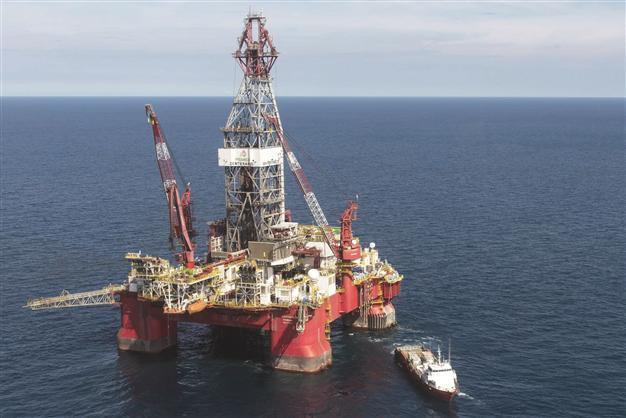Cypriot peace ‘to lead the way for energy’
ANKARA

Turkish Energy Minister Taner Yıldız repeated Turkey’s willingness to transport Cypriot oil and gas to world markets, via a pipeline that could pass through the country if the political disagreements at the region would be settled. AFP Photo
Turkish Energy Minister Taner Yıldız has welcomed the latest peace negotiations between Turkish and Greek Cyprus leaders as a step that could pave the way for energy projects.“The softening between the Turkish Republic of Northern Cyprus and the Greek Cypriot administration is, of course, significant,” Yıldız said yesterday, answering reporters’ questions ahead of the Atlas for Biomass Energy Potential publicity meeting in Ankara.
“I hope for the dispersal of the negative political environment in the Mediterranean and the opening of the way for energy-related projects,” he added.
“I believe a pipeline that would carry Cypriot gas to Europe via Turkey could be built, just like the way we carry water to Cyprus with pipelines,” Yıldız said, noting that “political feasibility” was the main pre-requisite for such projects. “I think the energy sector is eligible to handle these projects, both in terms of financing and technicals,” he said.
Yıldız also praised the joint statement recently released by the negotiating parties, describing it as “a study that consolidates Turkey’s argument.” Turkey has long argued that the southern Cypriot authority should share the income from the sale of recently discovered off-shore energy resources with both sides of the divided island. Turkey is opposed to Greek Cyprus exporting oil and gas, saying the energy wealth also belongs to Turkish Cypriots. This stance has led to accusations of “gunship diplomacy” from the Greek Cypriots.
However, the recently agreed upon statement recommends recognizing the equal statuses of the two states, while aiming to bring the divided communities closer under a federal government.
Energy as catalyst
The island’s untapped offshore gas and oil riches and huge natural gas find in waters off neighboring Israel have changed the dynamics in the region.
Hopes are high that these factors can transform the current frosty climate into one of reconciliation and trust that would make an elusive peace deal achievable.
“Turkey and Israel’s energy cooperation has triggered an American intervention and forced both sides to agree on a joint statement leading to a resumption of talks,” Hubert Faustmann, associate professor of history and political science at Nicosia University, told Agence France-Presse.
“Washington has put so much weight behind this latest peace effort because oil and gas is a game changer in the wider context ... It’s a win-win situation for all,” he added. Faustmann also said the lack of a Cyprus settlement after 40 years of division was hindering Israel’s cooperation with Nicosia to export gas.
“Israel is looking to diversify through its gas pipeline through the sea of Cyprus to Turkey and invest in an LNG plant on the island, but Israel won’t give its gas to Cyprus unless there is a solution,” he said.
The U.S., which has commercial interests in the island’s gas and oil exploration, is aware that a divided Cyprus is a source of tension for NATO members Greece and Turkey, Faustmann added.
No South Pars plans
ANKARA
Energy Minister Taner Yıldız has said Turkey does not currently have any plans to invest in Iran’s giant South Pars gasfield, but is open to making offers.
“The Turkish Petroleum Corporation [TPAO] doesn’t have any investment decision at this moment,” Yıldız said yesterday.
“We had taken the decision to not make investments after making studies on South Par field.
But I have to say we could re-evaluate this if Iran has any new offers,” he added.
















